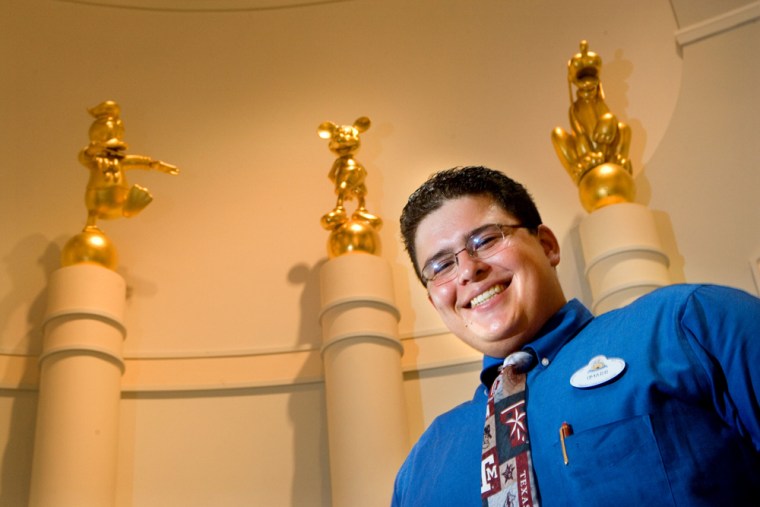Dan Cockerell spent his time as a Walt Disney World college intern checking guests into their hotel rooms, working as a custodian and parking cars. He says the experience 16 years ago has been useful in his current job as general manager of the Disney All Star Resort.
Each year, 8,000 students come to Disney World to work as six-month college interns in one of the largest internship programs in the country. The interns make up a significant portion of Disney World’s 55,000-person work force. They learn about customer service and absorb Disney’s hospitality culture.
“It’s very different for the students from working at the local mall,” said Kristi Breen, manager of college and international recruiting at Disney World. “It’s training that I think will stay with someone forever.”
But aside from giving interns valuable experience, the program is a relatively cheap source of labor for Disney and sometimes worries the unionized workers, although union officials approved the program when it began almost 25 years ago.
“None of them are paid properly,” Ed Chambers, president of United Food and Commercial Workers Union, Local 1625, said of the college interns. “They’re like indentured slaves ... They live on Disney property. They eat Disney food. They take Disney transportation.”
Most of the college interns earn $6.25 an hour, well below the more than $11 an hour pay for a veteran employee performing the same tasks. Interns also don’t receive any pension or health care benefits like regular workers.
Regular workers sometimes grumble about the college interns when business is slow and their work hours are cut back, such as after the Sept. 11 terrorist attacks
Last year, the college interns, along with part-time high school students and international students, worked almost a seventh of all available scheduled hours in jobs such as lifeguards, fast food servers and merchandise salespeople, according to figures compiled by the unions at Disney World.
Disney’s California parks also have a college program but it’s on a much smaller scale. Only a few hundred students participate in it, and unlike in Florida, the company doesn’t offer housing. Disney generally docks $79 or more a week from the Disney World interns’ paychecks to pay for housing.
Some students leave the program like Cockerell, with a step on the career ladder at the company.
But a few, like Steve Cippittelli, leave with dashed expectations.
Cippittelli, a Schenectady County Community College student, was forced to leave the college intern program last year after a co-worker accused him of making a vulgar remark. Unlike regular hourly workers, who have the right to join unions, the community college student didn’t have any labor representation, and he said he was unable to defend himself properly.
“It hindered my education quite a bit. That was a major requirement and I was not able to finish my college education,” said Cippittelli, who hopes someday to work again at Disney World since he loved the experience.
Disney spokeswoman Kim Prunty said in an e-mail that the company doesn’t comment on individual workers. But Disney’s goal is for every participant to complete the program and that disciplinary action is taken based on the available facts, she said.
“There are guidelines students are expected to follow,” she said.
‘We’re there to create magic’
Despite his concerns, Chambers said the program probably is a good experience for the students because they learn what it’s like in the working world.
Joanna Gonzalez, a University of Florida graduate, said serving fast food in the Magic Kingdom helped her become quick on her feet and overcome shyness.
“We’re not there to flip burgers, or to give people food. We’re there to create magic,” said Gonzalez, 23, who now works at the Department of Homeland Security in Washington. “When I worked there, I opened up. The confidence it builds in you is huge.”
Less than half of the students earn college credit during their internships. Those who do pay tuition to their universities and can take classes on subjects such as communications, hospitality management or human resource management taught by Disney executives with higher education degrees. They can earn anywhere from three to 12 credits depending on their school.
“Many times when the students come back here, I have local employers ask me if they can have some of the students who were in the Disney program ... because Disney has such a reputation in the area of customer service,” said Bud Miles, a business professor at the University of North Carolina at Greensboro. The school sends 75 to 100 students to the program each year, and Miles serves on an advisory board for the internship program.
Disney World offers a more advanced internship program for alumni of the college program. The advanced program offers work in white-collar jobs that are more closely aligned with students’ studies, rather than jobs in the parks or hotels.
Omarr Cantu, who recently graduated from Texas A&M with degrees in history and communications, worked as a ride operator at the Tomorrowland Indy Speedway in the Magic Kingdom four years ago. His experience this summer is quite different since he is working as an advanced intern in the marketing department of the resort’s human resources department.
Cockerell regularly tells college interns that they can handle anything after being in the program.
“Guests walk up to you and ... they expect all the great service and heritage, and you have to know everything about everything,” Cockerell said. “It’s a bit overwhelming. So I tell the college program students, ‘Just roll with it. I guarantee if you get through this thing, you’ll get through a lot.”’
